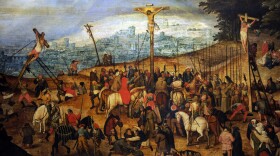
Lulu Garcia-Navarro
Lulu Garcia-Navarro is the host of Weekend Edition Sunday and one of the hosts of NPR's morning news podcast Up First. She is infamous in the IT department of NPR for losing laptops to bullets, hurricanes, and bomb blasts.
Before joining the Sunday morning team, she served as an NPR correspondent based in Brazil, Israel, Mexico, and Iraq. She was one of the first reporters to enter Libya after the 2011 Arab Spring uprising began and spent months painting a deep and vivid portrait of a country at war. Often at great personal risk, Garcia-Navarro captured history in the making with stunning insight, courage, and humanity.
For her work covering the Arab Spring, Garcia-Navarro was awarded a 2011 George Foster Peabody Award, a Lowell Thomas Award from the Overseas Press Club, an Edward R. Murrow Award from the Corporation for Public Broadcasting, and the Alliance for Women and the Media's Gracie Award for Outstanding Individual Achievement. She contributed to NPR News reporting on Iraq, which was recognized with a 2005 Peabody Award and a 2007 Alfred I. duPont-Columbia University Silver Baton. She has also won awards for her work on migration in Mexico and the Amazon in Brazil.
Since joining Weekend Edition Sunday, Garcia-Navarro and her team have also received a Gracie for their coverage of the #MeToo movement. She's hard at work making sure Weekend Edition brings in the voices of those who will surprise, delight, and move you, wherever they might be found.
Garcia-Navarro got her start in journalism as a freelancer with the BBC World Service and Voice of America. She later became a producer for Associated Press Television News before transitioning to AP Radio. While there, Garcia-Navarro covered post-Sept. 11 events in Afghanistan and developments in Jerusalem. She was posted for the AP to Iraq before the U.S.-led invasion, where she stayed covering the conflict.
Garcia-Navarro holds a Bachelor of Science degree in international relations from Georgetown University and an Master of Arts degree in journalism from City University in London.
-
Researchers exposed cheese to different genres of music for 24 hours a day over six months to find out that hip-hop might create the tastiest cheese.
-
The narrators in Laila Lalami's new novel have one thing in common: They've all "had the experience of dislocation," Lalami says. Together, they form a mosaic of race and class in America.
-
In Miami's Liberty City neighborhood, a group of men have been holding a hunger strike to protest gun violence in their community.
-
After authorities were tipped off about the heist, they replaced the Flemish masterpiece with a replica.
-
MIT Technology Reviewwrote about a study that found hipsters look alike. A man mistakenly thought the photo at the top of the story was of himself and threatened legal action.
-
Jennifer Carrieri's twin was shot and murdered in an empty parking lot in 1996, but nobody knows why. This year, Carrieri put up billboards in Baltimore, Md., in the hopes of solving the cold case.
-
The more than 200 artifacts were discovered in a previously sealed cave beneath the ancient Mexican city Chichén Itzá. Explorers had to crawl for hours to reach the archaeological materials.
-
Sariñana's latest album, ¿Dónde Bailarán Las Niñas?,encapsulates her becoming a mother, balances her vulnerability and addresses sex crime rates in Mexico.
-
Author Aida Salazar didn't want her daughter to feel ashamed about getting her period. "I wanted to reframe the conversation," Salazar says. "I wanted to tell a different story."
-
Mirror, mirror on the wall, who's the most Florida of them all? A new top 10 list of bizarre stories from a Miami-based injury claims company attempts to answer that question.
-
Kindergartners from Georgetown Day School in Washington D.C., help NPR's Lulu Garcia-Navarro field questions to McClain, who's an astronaut serving on the International Space Station.
-
The author of the bestselling Shopaholic series is back, with a new novel about a woman who's addicted not to shopping but to fixing the lives of the people around her — at the expense of her own.








